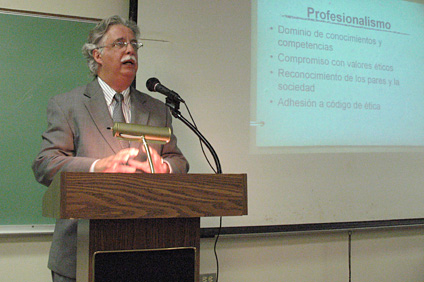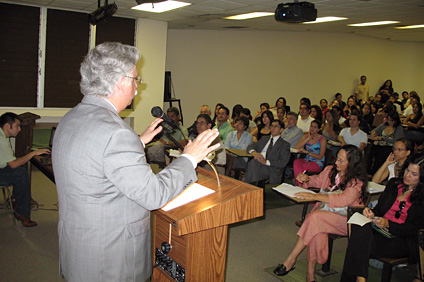|
|
|
Friday, October 10th 2008 [ versión español ]
“It is crucial that future professionals understand the importance of reflection and always keep ethics in mind; learning ethics shouldn’t only be limited to the knowledge of specific rules.” Dr. Ernesto Frontera Roura, President of the Bioethics Advisory Council of Puerto Rico, informed his audience, at the conference, “Ethical Professionalism and Responsibility: Current Strengths and Weaknesses,” that was given recently at the University of Puerto Rico at Mayagüez (UPRM).
The presentation was in regards to current trends in ethics, according to an investigation carried out by the Chancellor’s Office, as a demonstration of his support for the project, “Graduate Education in Research Ethics for Scientist and Engineers (GERESE), financed by the National Science Foundation and coordinated by Dr. Jorge Ferrer of the Humanities Department. The Center for ethics in the professional world also collaborated in organizing the activity.
Dr. Frontera, who is a psychiatrist and former professor of the Central Caribbean University Medical School, based his presentation on the ethical criteria of the medical profession, which, as he explained it, could be applied to any career or research field.
Frontera proposed the fundamental principles and commitments of the medical profession, in accordance with a document created by regulatory organizations from the United States and Europe in 1999. He mentioned, as examples, the need to look out for the patient’s well being, respect their autonomy and promote an evenly balanced distribution of health resources.
“These principles and commitments make-up the backbone of the doctor-patient relationship. The challenge is to stick to them, and resist the corporate mentality and the influences of marketing in a profession that is founded on serving others,” mentioned the speaker, who is the founder and first director of the UCC Biomedical Center of Humanities.
Frontera explained that educational institutions, university professors, and regulatory organizations have the responsibility to look out for the integrity and ethics of their profession through of the expansion of ethical codes. Not withstanding, he advised that “these efforts aren’t enough to guarantee the integrity of the profession,” because new policies need to be brought about.
The psychiatrist showed, from a different angle, the relationship between a doctor and his patient, regulated or aided by third parties, in the case of this particular profession, composed of heath insurers, the government, the pharmaceutical industry, and hospitals among others. He explained that this third party not only has an impact on the medicine, but in the field of scientific investigation, and the academy as well.
As examples, he mentioned the conflict of interest that visits to physician’s offices from pharmaceutical company representatives to offer medicinal samples and free-bees; the support of the pharmaceutical industry of medical organizations and communities; and financial aid from the industry for academic research projects, which are usually in association with future interests, to name a few.
In respect to scientific investigation, Frontera emphasized that the industry could largely influence the agendas of educational institutions.
“By measuring the economic vulnerability of an institution, it helps to decide whether it easily falls prey to these visits, which are justified and rationalized by the necessity to keep their staff employed, even though the process devalues their purpose, which is the search for truth, autonomously, independently with the purpose of sharing the knowledge gained with the rest of humanity.”
The Bioethical Advisory Council President named some other weaknesses of ethics in the medical field such as: marketing campaigns for over-the-counter medicine, the absence of discrepancy with respect to the industries economic situation, the excessive control by health insurers, and the commercialization of health, among others.
“It’s not only about fighting corruption against the integrity of the profession, but also putting an end to the mentality that favors, tolerates, justifies and rationalizes it. The medical profession has lost its credibility by accepting benefits and gifts from the industry. Is the same thing happening to the world of academics, and scientific investigation?” Questioned Frontera.
To eradicate these conflicts Frontera favors a complete revision of the current mental state of the field, which implies, among other actions, that doctors and researchers become aware of the problem and change their conduct. The psychiatrist quoted Dr. Howard Brody, a Bioethicist from the United States, who proposes a strategy of “detachment”.
He added that to achieve a more respectful relationship that protects the integrity, Brody suggests the following methods: abstaining from participation or relations that could morally compromise the professional, deferring the delivery of samples or free-bees associate with marketing forces, and in the case of academic institutions, only accept donations from the industry if the institution maintains control of the investigation and its processes.
Frontera concluded his presentation with a quote from Dr. Adela Cortina, a Bioethicist from Spain, who claimed that the corruption stems from the loss of the profession, and the relinquishing of its excellence, a principle that should always be present, in every profession.

Dr. Ernesto Frontera Roura, President of the Bioethics Advisory Council of Puerto Rico, presenter of the conference on ethics.

The speaker presents, to a rather largely crowded conference room, about the strengths and weaknesses of professional ethics.
Photographs by Juan A. García Jiménez / UPRM Press
|

